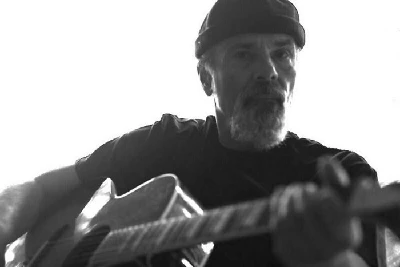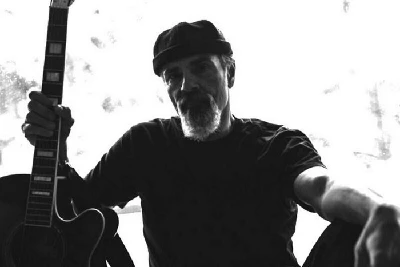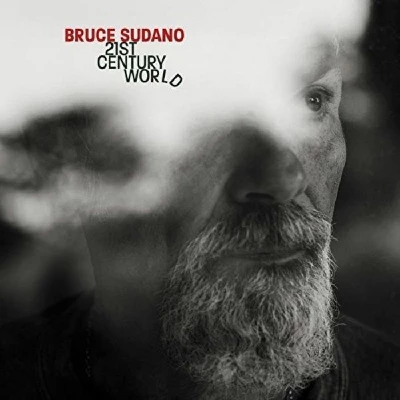published: 30 /
6 /
2017

Award-winning songwriter Bruce Sudano talks to John Clarkson about his developing career as a solo artist and his political new album '21st Century World'
Article
“My big fear in my life was to step out there on my own and let my words be my own voice,” says Bruce Sudano during an interview with Pennyblackmusic. “It was the one hurdle that I tap-danced around for much of my life, and once I got to this place in which my wife was gone and my kids were grown I had no more excuse to avoid it.”
Sudano, who is 68, is an award-winning American songwriter. Raised in New York, he met with his first success at the age of twenty when he co-wrote with his mentor Tommy James of the 60’s American rock group Tommy James and the Shondells their 1969 hit, ‘Balls of Fire’. He has since then gone on to write songs for Jermaine and Michael Jackson, Dolly Parton, Reba McEntire and perhaps most famously his late wife, 70’s 'Queen of Disco' Donna Summer, with whom he co-wrote many songs including the hit single and title track of her 1979 biggest-selling album, ‘Bad Girls’.
Bruce Sudano was also the keyboardist in 70’s pop rock bands Alive N Kickin’ and Brooklyn Dreams. Although his first solo album ‘The Fugitive Kind’ came out in 1980, he did not release a second solo album ‘Rainy Day Soul’ until 2004 and his third ‘Life and the Romantic’ until 2009, focusing instead on writing songs for other artists and playing and working as musical arranger in Summer’s backing band.
Since Summer's death from lung cancer in 2012, Sudano has written and recorded another three albums, 'With Angels on a Carousel' (2014), which reflected on her illness and passing;'The Burbank Sessions' (2015) and this year's '21st Century World', which was produced by Mike Montali, the front man with New York-based rock and roll act Hollis Brown.
A stripped down record, largely based around guitars and drums and pushing Sudano's rich bluesy vocals to the fore, '21st Century World' is his first overtly political record. Its tracks include the breezy 'Your World Now' in which Sudano challenges the next generation to sort out the chaos his generation has left it in ("It's your world now/Turn it upside down because its your world now"); protest song 'It Ain't Cool' which lambasts the self-enhancing capitalism of today's political leaders ("It's a selfish society where the almighty dollar bides the rules") and the compassionate 'When Cinderella Dies' about the plight of many single mothers ("He left her standing at the side of the road/No destination, no way to go").
Other songs include 'Charade' which weighs up social media and internet culture; the reflective 'Coney Island Days' and a stark cover of Tracy Chapman's 'Talkin' 'Bout a Revolution'
Pennyblackmusic spoke to Bruce Sudano about '21st Century World' and its songs.
PB: You have said that you want “to start a dialogue about what is going on in our culture and society” with ‘21st Century World’. Have you always been political or is that something that has developed more recently with you?
BS: It is something that has grown upon me. I have always written from a place of personal experience, but this time because of what is going on in culture and society it overruled any other aspect of my soul. I just couldn’t ignore it and when I started writing these were the things that came out. It is entirely about aspects of our culture.
PB: Do you see ‘21st Century World’ then as a concept album?
BS: I don’t really see it as a concept album because there is not really an overriding theme to ‘21st Century World’, other than I am touching on cultural issues. Those issues change from self-serving government, to what is the line between Christianity and compassion and how do they relate, to issues of single motherhood and the breakdown of marriage in our culture. So, it is not one point of view. I am more asking questions and highlighting things rather than preaching.
PB: The first track ‘Your World Now’ highlights the problems of society and then asks the younger generation –and presumably those people of your daughters’ age and your grandchildren’s age –what they are going to do about it? How much hope do you see for them for the future?
BS: I am a person of hope. I believe in the resilience of the human spirit and, as confused as some of the younger generation are, I also encounter youth that inspire and are inspired and have great minds and aspirations. I have faith in them, I have faith in the ideals they possess and the ability to make the right changes. I think as a society we tend to swing from one end of the spectrum to the other, so even though we are in this moment of confusion in the world I have faith in youth to rise to the occasion. With ‘Your World Now’ I was really wanting to empower and to encourage that.
PB: ‘It Ain’t Cool’ was recorded shortly before Donald Trump won the American presidential election. Was that inspired directly by his rise and that of other self-serving business politicians like him?
BS: I think that the aspect of self-serving government has been going on for a while. Maybe this election is the ultimate evolution of that but it is an issue that has been growing for a long time. The idea that you get into government because you want to have a successful career and have power and money wasn’t the initial idea. The idea was to get into government to serve the country and its people for the greater good of society. Those motives have, however, changed. ’It Ain’t Cool’ wasn’t directed at Trump but he is the outcome of that way of thinking.
PB; ‘Charade’ is critical of social media and Instagram culture in particular. What is your main concern with social media? Is it the emptiness of so much of what is being published on it or just the total lack of shame when people are publishing items about themselves or other people that can sometimes come with it?
BS: It is a combination of both. I was out doing shows last weekend and it was a really young audience. I realised after I did it that they were confused as to how to respond because they took it as if I was speaking down to them.
I am going to set it up live in future by introducing ‘Charade’ with a concept of “Look! Social media is a great thing and the ability to communicate and reach around the world and share your thoughts and ideas is really a positive thing, but at the same time you have to be aware and think about things before you put out them there because it is forever it can affect your future negatively.”
As with all things there is a positive and there is a negative, and I think in ‘Charade’ I want to highlight the negative but not make anybody feel it is a bad thing. Maybe I missed it in the song in clarifying that, but certainly when I perform it live I am going to set it up properly in future.
PB: ‘When Cinderella Dies’ tells the story of someone who has single motherhood thrust upon her when she is abandoned by her husband. Was it anyone in particular that inspired that story?
BS: I was somebody that was married for over thirty years and through the circumstances of life I found myself as a single guy out in the world again. I was shocked to encounter so many women that were single mothers and trying to find their own life again. They were these women that had got married with hopes and dreams of happy ever after, only to wind up in a place in which they were trying to survive and raise and support their kids and find out who they are again. They had to realign their dreams to get on with their life, and I saw that as an epidemic.
From there it led me to a place in which I was trying to understand what’s going on with the concept of marriage. Had people lost value in the commitment of marriage? Did people not take it seriously anymore? Do people now just look at it as “Well, if it doesn’t work I am out of here?” The real purpose of marriage is that it is a commitment. That isn’t to speak down to anyone who gets divorced. These things happen, but at the same time going into a marriage needs to be respected and we need to have integrity in the commitments that we make,
PB: ‘Talkin’ ‘Bout a Revolution’ is a cover of an old Tracy Chapman song. It is the first ever cover that you have recorded. Why did you decide to cover that?
BS: I have always been reluctant to do cover songs, mainly because I consider myself a songwriter before being a singer. In my mind my excuse for singing has always been that I wrote the song which allows me to sing it (Laughs). I have had the luxury in my life to work with great singers and I have never seen myself in that light, but my producer Mike Montali was very encouraging and said, “Come on, no, Bruce, you have a great voice and something to say and a way of communicating which not everybody does so why don’t you do a cover?”, so I reluctantly agreed and set about looking for a song that I felt fitted in with the issues and the themes that I was talking about on this record.
I am a long-term fan of Tracy Chapman and she is someone who I think often gets overlooked. I just found ‘Talkin’ ‘Bout a Revolution’ to be as current and important and as meaningful today as it was twenty years ago so that was how I landed on that song.
PB: The final track on the album is ‘Coney Island Days’. What is that song about?
BS: ‘Coney Island Days’ is the story of a guy who is walking down the beach at Coney Island and looking back over his shoulder and wondering, “How did I wind up here?” He was somebody who was afraid to take challenges in life and who was bound by fears from his childhood, and it froze him in his life and now he has got to a place where he is questioning, “Why didn’t I step up? Why didn’t I step out?” And at the same time he is trying to accept where he is now and what his life is, so it is really a reflection of a life lived with some regret I have to say.
PB: Your last album ‘The Burbank Sessions’ was written and worked out on tour and then recorded directly after that using no more than two takes. How was this one recorded in contrast?
BS: This one wasn’t recorded all that much differently. I went on European tour last Fall with Hollis Brown, and Mike Montali and I developed a close relationship during the time that we were on the road together. When it came time to make this record I wanted a different and a younger voice to oversee it. I have been at this game a long time and when you have been doing something a long time you develop habits that you fall back into. Your perception will be different from a younger perception, so as I was writing songs I started sending them to Mike and getting his take on them and his idea of how he visualised them. I wanted it to be a more stripped down, urgent record. I didn’t want a lot of fluff and a lot of notes and whistles and production. I wanted it pretty straight and Mike had the same viewpoint.
We went into a Lower East Side basement studio in New York and recorded it over three days, and then added a couple more days on for overdubs on vocals. We then did a couple more days on mixes, so it was a very quick process whereas in the past I would sometimes take three months to make a record.
I no longer view that as my method. Now the majority of my time is spent coming up with the right song. I then try to avoid belabouring the production process and to get done it quickly. I feel the message of the songs come through more quickly.
PB: Your first solo album ‘The Fugitive Kind’ came out in 1981 and then there was a big gap of twenty-three years until your second album ‘Rainy Day Solo’ in 2004. Since then you have put out another four more albums including this one and three of them have come out in the last three years alone. Why do you think there has been this rapid increase in productivity?
BS: The focus of my life has shifted. When I did my first solo album it was right before I got married and started having children, and once I got married and the kids arrived my wife had a very big career and I was involved in that. I was involved in being a husband and a father, and I felt at that point I couldn’t manage to maintain my solo career as well. My initial dream was always to be a songwriter, so as long as I could continue to write songs which I did over the years for both other artists and movies then my creative spark was satisfied. At the same time I was able to manage my family and my marriage because maintaining those were a priority as well.
When my wife got sick I started writing my solo album ‘Angels on the Carousel’ which details aspects of going through that process. ‘The Burbank Sessions’ details me coming out of that and moving on with my life and that led into ‘21st Century World’. As my children are grown and I am no longer married, I have ample time and energy and creative juice now to focus on my solo career.
PB: You have toured recently with both your son-in-law’s band Johnnyswim and also the Zombies. How did that go?
BS: Most of the time when I tour I tour solo or occasionally with another guitarist.
The Zombies have a built-in fan base that is both young and old, but while they have a full band and I was an acoustic opening act, they have an audience that wanted to listen and it worked very well.
I have to say the same for Johnnyswim. The challenge was a little bit different there because it was a much younger audience, so you never know how you are going to be received but what I have found in most cases is that you have an audience that is willing to listen if you have got something to say. Both audiences were receptive and by the end of the set they were singing along and cheering me on. It was a very good experience in both cases, and I look forward to doing more with both of them.
PB: Will you be touring much during the rest of this year?
BS: Yes, as we speak European dates are being put on the books and I am looking forward to doing dates in the United Kingdom, Italy, Germany and Holland this Fall and then I will go back to the States towards the end of the year.
PB: Thank you.
Band Links:-
http://www.brucesudano.com
https://www.facebook.com/brucesudanomu
https://twitter.com/brucesudano
Play in YouTube:-
Picture Gallery:-

